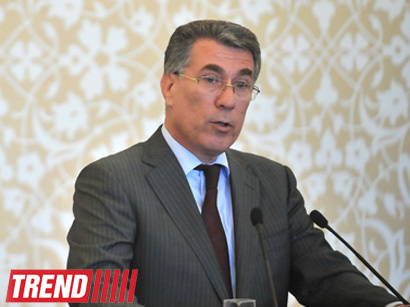Azerbaijani air traffic controllers not to service planes en route to rebel region

By Sara Rajabova
Deputy parliamentary speaker Ziyafat Asgarov has said Azerbaijani air traffic controllers will not deal with planes flying to the airport in Khankendi -- the center of the self-proclaimed Nagorno-Karabakh republic run by ethnic Armenians in the occupied Azerbaijani territories. Asgarov was commenting on the planned commissioning of airports in the occupied land.
Armenia recently issued provocative statements relating to the airport, Asgarov told journalists at an event at the High Oil School, dedicated to November 12, Azerbaijan's Constitution Day.
"The Khankendi airport has been rebuilt, but not yet put into operation," Asgarov said. "Yerevan uses various pretexts to start its operation, but is well aware that Azerbaijan will not allow this to happen."
Asgarov stressed that relevant Azerbaijani bodies are working on the matter, so parliament does not see a need for any further discussion.
Meanwhile, Russian Ambassador to Azerbaijan Vladimir Dorokhin said the opening of an airport in Nagorno-Karabakh will seriously exacerbate tension in the region, Interfax news agency reported.
The issue regarding the intention of the Armenian side to launch an airport in Nagorno-Karabakh is not new, and Russia, along with other mediators in the conflict resolution, has already expressed concern in this regard, Dorokhin said.
"We still consider that this move does not help to restore confidence... will lead to serious aggravation of tension in the region and therefore, is counter-productive in terms of the peaceful settlement process of the Nagorno-Karabakh conflict," Dorokhin noted.
"We think that the parties will use diplomatic methods to solve the problem, would not resort to the threat of attacks on aircraft and refrain from politicizing of this issue," he added.
Azerbaijani Deputy Foreign Minister Araz Azimov has said that the commissioning of the airport would be an open violation of the Convention on International Civil Aviation -- which was signed in Chicago in 1944.
The International Civil Aviation Organisation (ICAO) and the European Civil Aviation Conference (ICAC) support the position of Azerbaijan on this issue.
Azerbaijani Ambassador to Canada and permanent representative in the ICAO Farid Shafiev at a recent ICAO meeting drew the organization's attention to the Armenian intentions to commission an airport in Khojaly, a town where mass killings of Azerbaijanis were committed in 1992 during the war between the two South Caucasus neighbors.
613 people, including 63 children, 106 women and 70 elderly, were killed during the genocide in Khojaly committed by Armenian forces on February 25-26, 1992. A total of 1,000 civilians were disabled. Eight families were annihilated, 130 children lost one parent and 25 lost both. Moreover, 1,275 innocent people were taken hostage, while the fate of 150 remains unknown.
Shafiev noted that this provocation was contrary to international law and undermines security in the region.
Later, the ambassador said the airspace of the Azerbaijani territories occupied by Armenia is closed to civil aviation, and the flying of any aircraft in this area puts passengers' lives at risk.
The ambassador criticized Armenia's irresponsible step and noted that Azerbaijan has the right to defend its airspace, in accordance with relevant articles of the Chicago convention.
The Khojaly airport and airspace over Nagorno-Karabakh -- an Azerbaijani region which has been under Armenian occupation along with seven surrounding districts since the 1990s war -- and other occupied territories are under the jurisdiction of Azerbaijan, he added.
Shafiev stressed the illegality of arranging any flights of other countries without permission from Azerbaijan.
The head of social and political affairs at the Presidential Administration, Ali Hasanov, also underscored that restoring the former Khojaly airport, organization of flights by the separatist regime, receiving and sending aircraft in Azerbaijan's sovereign territory is illegal without settlement of the Nagorno-Karabakh issue.
The Nagorno-Karabakh conflict emerged in 1988 when Armenia leveled territorial claims against the neighboring country. Armenian armed forces have occupied 20 per cent of Azerbaijani land since a fragile ceasefire was signed in 1994 following the brutal war.
Russia, France and the U.S., which co-chair the OSCE Minsk Group, are brokering peace talks. The negotiations have been mostly fruitless so far.
Armenia has not yet implemented the U.N. Security Council's four resolutions on a withdrawal of its armed forces from Nagorno-Karabakh and the surrounding regions.
Here we are to serve you with news right now. It does not cost much, but worth your attention.
Choose to support open, independent, quality journalism and subscribe on a monthly basis.
By subscribing to our online newspaper, you can have full digital access to all news, analysis, and much more.
You can also follow AzerNEWS on Twitter @AzerNewsAz or Facebook @AzerNewsNewspaper
Thank you!
